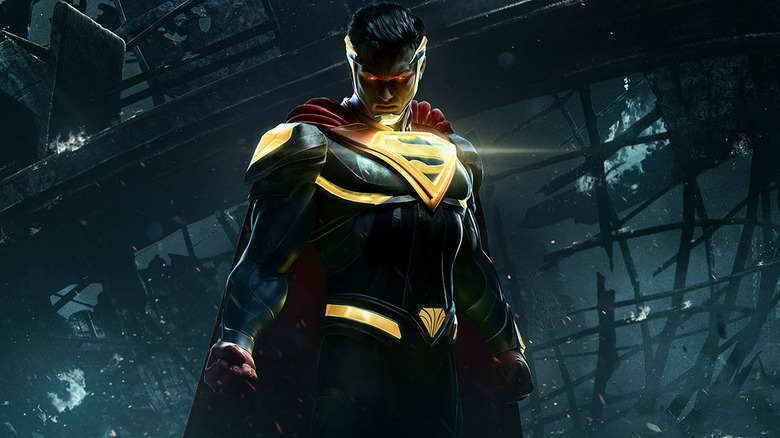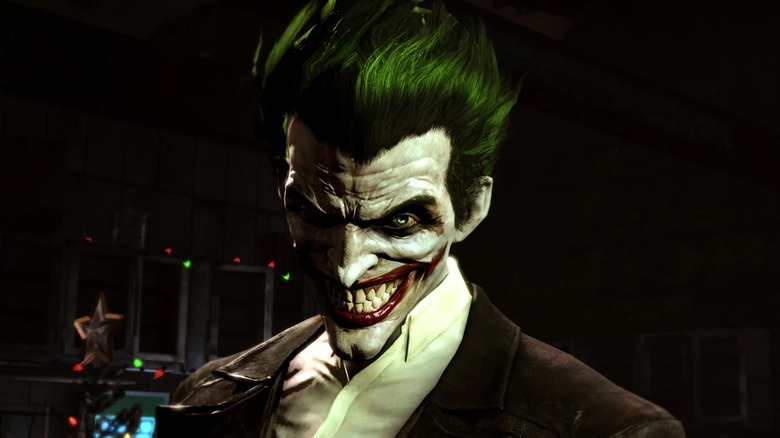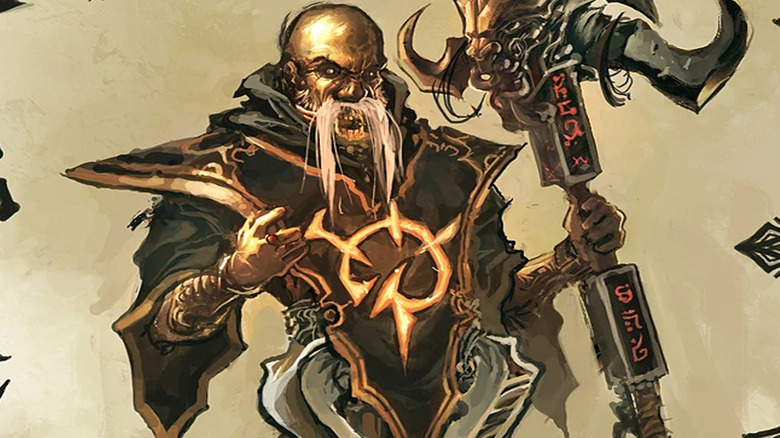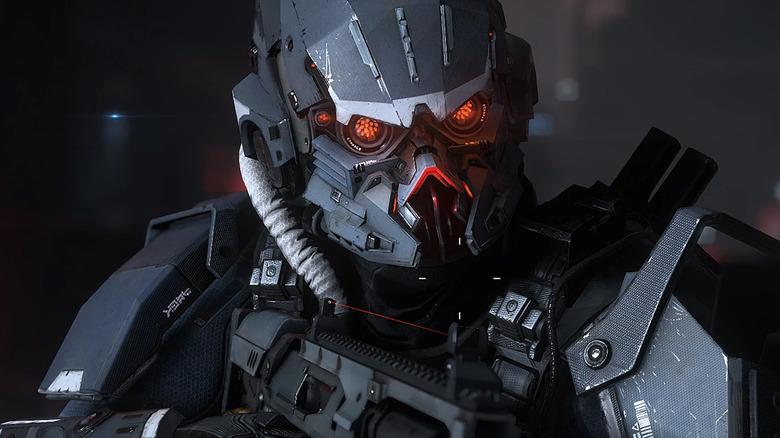When Bad Guys In Video Games Were Actually Right
There's nothing better than a little moral ambiguity to spice up a video game. Let's be honest: playing a hero whose sole purpose in life is to defeat the evil supervillain gets a little boring—we're looking at you, Mario. Thankfully, many video game developers have put in the extra effort with their characters and backstory, giving players a greater understanding of what really makes the "bad guy" tick. Even without altruistic motives or redeeming qualities, some villains are extremely good at pointing out truths that nobody else wants to admit. Let's take a look back at some video game "bad guys" who ended up being right all along. Warning: spoilers ahead!
Pagan Min - Far Cry 4
Far Cry 4's Pagan Min, King of Kryat, is eccentric, reclusive, and more than a little unhinged. But is he really all that bad? After a violent opening cutscene and a visit to Min's mountaintop hideaway, you sit down to dinner with Min. He promises to help you, and says that the Golden Path rebels in Kyrat are actually terrorists. Min's claims seem dubious at first, but after you escape his compound and join the Golden Path, you find these rebels and their leaders really are worse than the man they want to overthrow.
As the game continues, you learn what shaped Pagan Min into the despot he's become. After his daughter was killed by a Golden Path leader and the girl's mother fled the country, Min abandoned any chance for peace with the rebels. Despite this, Pagan Min always remains ambivalently friendly towards you—even after you try to kill him. Choosing to spare Min's life at the end of the game provides an even bigger twist to his tale, as he leaves you in charge of running the whole country. Alternatively, if you decide to trust Min during your dinner together at the game's beginning, he helps your character, as promised—proving he was right all along, and ending the game in less than an hour.
Dr. Breen - Half-Life 2
Some may believe that Half-Life 2's Dr. Wallace Breen betrayed mankind, but the truth is much more complicated. Several years ago, an alien empire called the "Combine" attacked Earth—winning the war in just seven hours. Believing that resistance was futile, Dr. Breen negotiated our surrender. The Combine put him in charge of the planet and tasked him with stamping out rebellion. To this end, Dr. Breen uses propaganda, violence, and other tactics—claiming that it's the only way to protect humanity from total annihilation.
In contrast, Gordon Freeman's enigmatic employer "The G-Man" causes mayhem, destruction, and war at every turn. He manipulates, coerces, and uses Freeman (and others) to serve his own mysterious ends. He even orchestrated the events which led to the Combine's invasion. Breen mocks Freeman for being one of the G-Man's pawns, and he has a good point. We never learn the G-Man's true motivations, but his actions make Breen look like a Boy Scout.
While Dr. Breen's "official" tale ends in Half-Life 2, former Valve head writer Marc Laidlaw gave fans some closure by publishing his Half-Life 3 plot outline. In it, Gordon Freeman mercy-kills an imprisoned Breen before launching a Hail Mary attack on the Combine. He then realizes that even humanity's most powerful weapon can not stop the alien empire—proving that Dr. Breen was actually right all along.
Joker - Batman: Arkham Origins
In Batman: Arkham Origins, players experience the early days of Bruce Wayne's crime-fighting career—including his first encounters with the Joker. During one of these meetings, the Joker tells Batman, "I've only been in Gotham for a few days, and I've already accomplished so much more than you." He might be insane, but the Joker is completely right. In this timeline, Batman has been fighting crime for two years, but it appears that he has very little to show for it.
Meanwhile, the Joker has assassinated Gotham's corrupt police commissioner, dethroned the city's most powerful mob boss, and exposed its worthless prison—all in less than a week. Batman's strict moral code and Bruce Wayne's reluctance to wield power publicly will always prevent him from creating lasting change within Gotham. These factors provide a perfect opportunity for someone like the Joker to take advantage of the situation. As the Joker concludes, "It's amazing what you can get done when you don't concern yourself with right and wrong."
Agent Edgar Ross - Red Dead Redemption
Red Dead Redemption draws a very fine line between "good" and "evil," which makes for some interesting moral dilemmas along the way. You play as reformed outlaw John Marston, whose quiet retirement is turned upside down when Agent Edgar Ross kidnaps his wife and child. Ross coerces John into hunting down the former members of his gang. The Agent finally releases Marston's family, but he later brings a posse to the outlaw's ranch, where they ambush and kill John. Years later, John's son Jack tracks down Ross and accuses him of murdering his father. "Your father killed himself with the life he lived," Ross tells him.
He may be a double-crossing backstabber, but Ross has a point. During the final shootout at the ranch, John emerged from the barn ready to die. None of the men in the posse opened fire until Marston himself began to shoot. He could have surrendered, but John preferred to go out with his guns blazing. There's no question that killing Edgar Ross for his betrayal gives a certain satisfaction, but the Agent was right about John Marston. If Marston had never become a criminal, he never would have been hunted down. If Marston had just obeyed the laws, he never would have been killed by a lawman. "Civilization may be dull, but the alternative is hell," Ross once pointed out. Turning over a new leaf doesn't guarantee a happy ending—sometimes, you can only find redemption when you're dead.
William Johnson - Assassin's Creed III
In Assassin's Creed III, William Johnson is the first of the Colonial Templars to die. Compared to the other Templars, William Johnson's motives are much more complicated. He grabs power and influence wherever he can, but Johnson also seems to care about the native people in the region. He wants to create a Templar enclave where they can be safe from the growing colonies. But when Johnson attempts to buy more land from the Iroquois, the leaders refuse—so Johnson threatens to murder them if they don't agree. Before Johnson can give the order, the Assassin Connor arrives and mortally wounds him.
With his dying words, Johnson explains that he just wanted to protect the native people from the colonists—something the British King will not do. "When the walls of the city constrict, when there's crops that need soil, when there's no more enemy to fight—we'll see how kind the people are then," he says. Johnson claims that the colonists will eventually spread out and take over the lands owned by the tribes, displacing and killing the natives. He was obviously very right—as evidenced by the real history of colonization and Indian removal in North America.
Zoltun Kulle - Diablo III
Long ago, Diablo III's Zoltun Kulle helped found an order—the Horadrim—which stood for justice and light. Unfortunately, the powerful mage turned bad while creating the "Black Soulstone," which he hoped would imprison the souls of the most potent demons and angels. Eventually, the other Horadrim banded together and defeated Kulle in order to stop his dark experimentation. Throughout the game, Kulle is presented as evil, egotistical, and corrupt—but he's also trying to do what he believes is best for humanity.
Kulle claims that only he is capable of returning humans to their demigod status of ages past, and he might be right. Certainly no other being in the Diablo universe appears to understand the full nature of his research into the matter. When you're later forced to collaborate with Kulle, he warns that your other allies—like the witch Adria—are plotting betrayal. While Kulle shows his true colors when he turns against you, he was completely right about Adria. She later offers up a betrayal of her own when it is revealed that she is actually a servant of Diablo himself.
Dr. Wily - Mega Man 9
In Mega Man 9, classic "bad guy" Dr. Wily reprograms some of Dr. Light's robots and sends them on a rampage—but it turns out he actually has their best interests at heart. As Dr. Wily points out, millions of faithful robots end up junked each year, just because they've reached their mandatory expiration date. "You're all still quite useful! You have a right to live," he tells the robots. He's still a supervillain, but Dr. Wily is absolutely right. Why should millions of sentient robots be destroyed to satisfy an unfair and arbitrary law? Why hasn't their creator Dr. Light—or Mega Man himself—done something to save them from the scrap heap?
Even worse, once Mega Man and Dr. Light learn about Wily's motives, they never mention the expiration law again. During the Mega Man 9 credits, it's implied that Dr. Light repaired the robots that Dr. Wily reprogrammed, but the unjust law remained unaddressed until the fan-made (and thus, totally unofficial) game Mega Man: Rock Force. At the end of Rock Force, Dr. Light finally admits that Dr. Wily was right, and promises to take steps to ensure the law is abolished in the future.
Superman - Injustice: Gods Among Us
In the alternate universe of Injustice: Gods Among Us, the Joker nuked Metropolis and killed millions of people. What's more, he tricked Superman into killing the pregnant Lois Lane and setting off the nuclear device himself. Later, Superman breaks into an interrogation room and murders the Joker in a rage. Then Superman sets up a worldwide authoritarian regime in an effort to snuff out all crime. Batman leads a rebellion against him, bringing in heroes from a parallel universe (including a "good" Superman) to help.
Batman and the other heroes despise Superman for his actions, but his motivations make perfect sense. Their justice system is ineffectual and corrupt. Heroes refuse to kill, so villains feel safe wreaking havoc because there are no real consequences. A blind dedication to the moral high ground is what causes the destruction of Metropolis, just as surely as the Joker himself did. Put in perspective, can anyone really blame Superman for executing someone who gleefully admits to murdering millions of people? At the end of Injustice, even the "good" Superman admits he might have killed the Joker, too. More to the point, how many innocent lives could have been saved if Batman had done it himself years ago?
The Helghan Emipre - Killzone
In Killzone and its sequels, the Helghan Empire seems evil to the core at first. Almost every in-game detail about them mirrors real-world Nazi Germany. If the Helghan people are essentially Space Nazis, then those who oppose them must be the heroes, right? Well, not quite. The Helghan Empire claims that the game's protagonists—the UCN and the ISA—are really to blame for their ongoing wars. If you take a look at Killzone's backstory, they're actually right. Long ago, the UCN loaned a corporation some money to start two planetary colonies. When the corporation didn't pay the UCN back on time, the UCN and ISA mounted a brutally-effective war against them. They tortured, taxed, and sanctioned the surviving colonists and workers—then exiled them to the barren and inhospitable planet Helghan.
Most of the exiles died on Helghan, but descendants of the survivors evolved and adapted to the harsh environment. However, every time they started rebuilding their society, the ISA attacked them again or sabotaged their economy. At one point, depression and famine struck Helghan and killed much of the population. Afterwards, one survivor started an authoritarian political movement—which eventually became the Helghan Empire. When the Empire finally try to fight back against their oppressors, the ISA nukes Helghan in retaliation—leaving the entire planet uninhabitable, and forcing the survivors into exile yet again. While many leaders of the Helghan Empire have been unspeakably evil people, they're still absolutely right about the evils that have been committed against them by the "good guys."
Arthas Menethil - Warcraft III
Prince Arthas Menethil became one of the most reviled characters in Azeroth in his role as the Lich King. Many claim Arthas' actions in Warcraft III began his downfall, but the blame actually lies with those who questioned his orders. In Warcraft III, the demon Mal'Ganis started a plague which turned infected victims into zombies. Prince Arthas rushed to protect the city of Stratholme, but he was too late. Though they were still alive, nearly all of the people there were already infected. To prevent the plague from spreading, Arthas ordered his forces to kill the citizens and burn the city. However, his lover Jaina Proudmoore and his mentor Uther the Lightbringer refused to take part and abandoned Arthas instead.
In retrospect, Arthas made the right decision at Stratholme. The citizens were not zombies yet, but they soon would be. With no known cure, what else could Arthas have done? Killing them before they could become undead was the only viable choice. In World of Warcraft, the Prince's motivations and the consequences of that choice are explored further in the "Culling of Stratholme" dungeon. In it, players help Arthas purge the city—and witness his failed attempt at killing Mal'Ganis. If Uther and Jaina hadn't abandoned Arthas, the three could likely have killed the demon together. Then Arthas would never have followed Mal'Ganis to Northrend, gone in search of the cursed sword Frostmourne, or become the Lich King.




